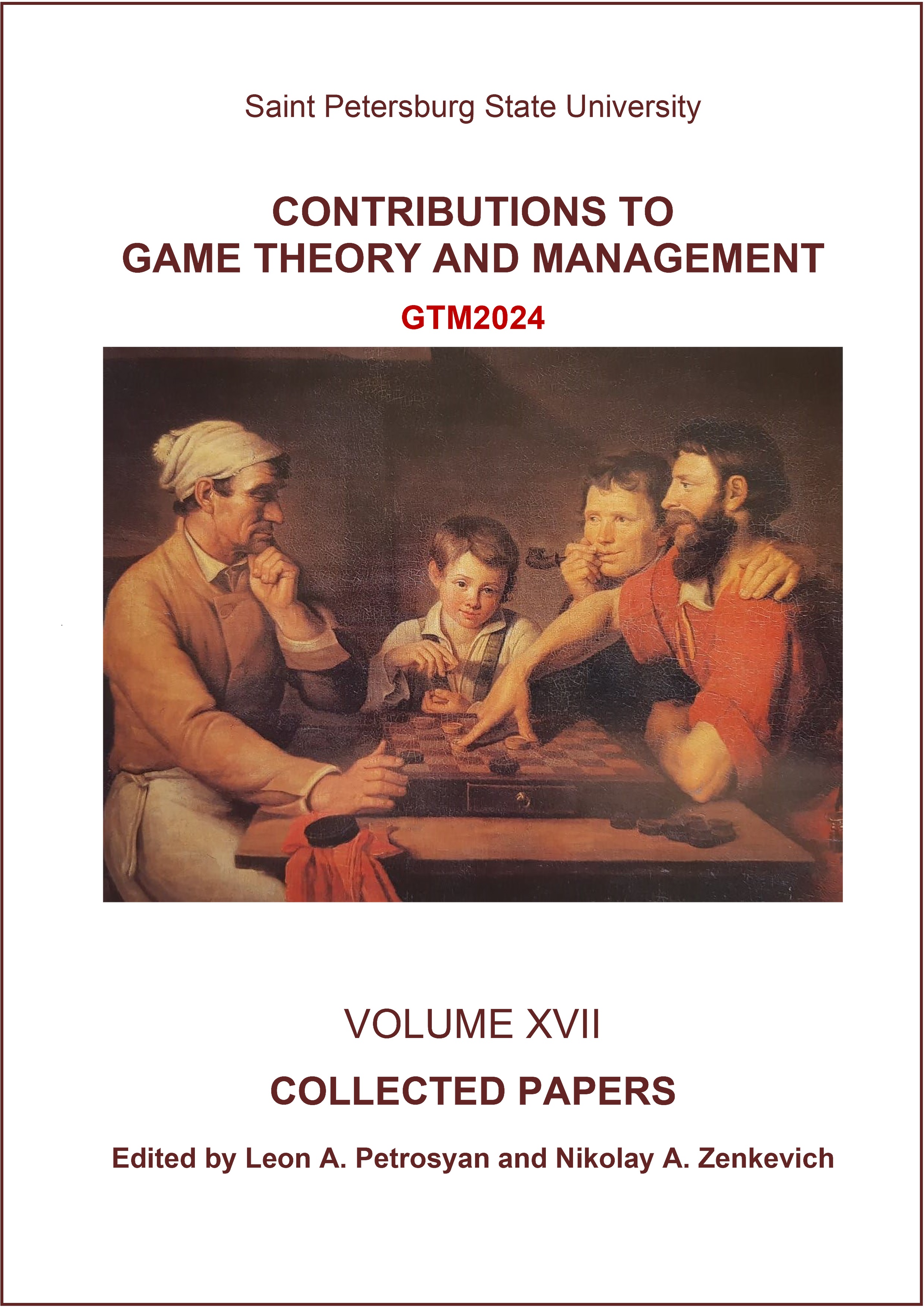Simulating Opinion Dynamics in Scale-Free Networks with Strategic Influence
Abstract
In this study, we investigate an opinion dynamics game with active and passive agents. Using a well-established framework for opinion dynamics, we formulate the problem as a linear-quadratic game with active agents competing for opinions. Our analysis focuses on the Nash equilibrium as the solution concept, under the assumption that active agents strategically select their actions throughout the game to minimize their individual costs. This paper places significant emphasis on numerical modeling to illustrate opinion dynamics. We aim to demonstrate how varying parameters impact opinions of passive agents and costs of active agents in the Nash equilibrium.
Keywords:
social networks, opinion dynamics, Nash equilibrium
Downloads
References
Albert, R., Barabasi, A. (1999). Emergence of scaling in random networks. Science. 286, 509–512.
Albert, R., Barabasi, A. (2002). Statistical mechanics of complex networks. Reviews of Modern Physics. 74(1), 47–97.
DeGroot, M. (1974). Reaching a consensus. Journal of the American Statistical Association, 69(345), 118–121.
Friedkin, N., Johnsen, E. (1990). Social influence and opinions. The Journal of Mathematical Sociology, 15(3-4), 193–206.
Jiang, H., Mazalov, V., Gao, H., Wang, C. (2023). Opinion dynamics control in a social network with a communication structure. Dynamic Games and Applications, 13, 412–434.
Hegselmann, R., Krause, U. (2002). Opinion dynamics and bounded confidence models, analysis, and simulation. Journal of Artifical Societies and Social Simulation, 5(3).
Kareeva, Y., Sedakov, A., Zhen, M. (2023). Influence in social networks with stubborn agents: From competition to bargaining. Applied Mathematics and Computation, 444, 127790.
Kareeva, Y., Sedakov, A., Zhen, M. (2024). Stackelberg solutions in an opinion dynamics game with stubborn agents. Computational Economics.
Mazalov, V., Parilina, E. (2020). The Euler-equation approach in average-oriented opinion dynamics. Mathematics, 8(3 , 355.
Mislove, A., Marcon, M., Gummadi, K., Druschel, P., Bhattacharjee, B. (2007) Measurement and analysis of online social networks. Proc. 7th ACM SIGCOMM Conference on Internet Measurement (IMC). 29–42.
Nemoto, T., Beglar, D. (2014). Developing Likert-scale questionnaires. JALT2013 Conference Proceedings.
Niazi, M., Özgüler, A. (2021). A differential game model of opinion dynamics: accord and discord as Nash equilibria. Dynamic Games and Applications, 11(1), 137–160.
Rogov, M., Sedakov, A. (2018). Coordinated influence on the beliefs of social network members. Matematicheskaya Teoriya Igr I Ee Prilozheniya, 10(4), 30–58.
Sedakov, A., Zhen, M. (2019). Opinion dynamics game in a social network with two influence nodes. Vestnik of Saint Petersburg University. Applied Mathematics. Computer Science. Control Processes, 15, 118–125.
Wang, C., Mazalov, V., Gao, H. (2021). Opinion dynamics control and consensus in a social network. Automation and Remote Control, 82, 1107–1117.
Zhen, M. (2019). Stackelberg equilibrium of opinion dynamics game in social network with two influence nodes. Contributions to Game Theory and Management, 12, 366–386.
Downloads
Published
How to Cite
Issue
Section
License
Articles of "Contributions to Game Theory and Management" are open access distributed under the terms of the License Agreement with Saint Petersburg State University, which permits to the authors unrestricted distribution and self-archiving free of charge.




